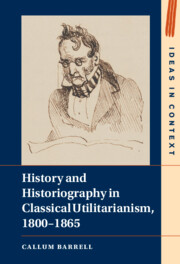20 results
Bibliography
-
- Book:
- History and Historiography in Classical Utilitarianism, 1800–1865
- Published online:
- 24 September 2021
- Print publication:
- 07 October 2021, pp 226-259
-
- Chapter
- Export citation
Epigraph
-
- Book:
- History and Historiography in Classical Utilitarianism, 1800–1865
- Published online:
- 24 September 2021
- Print publication:
- 07 October 2021, pp vi-vi
-
- Chapter
- Export citation
Conclusion
-
- Book:
- History and Historiography in Classical Utilitarianism, 1800–1865
- Published online:
- 24 September 2021
- Print publication:
- 07 October 2021, pp 220-225
-
- Chapter
- Export citation
Part III - Sciences of History
-
- Book:
- History and Historiography in Classical Utilitarianism, 1800–1865
- Published online:
- 24 September 2021
- Print publication:
- 07 October 2021, pp 145-219
-
- Chapter
- Export citation
Copyright page
-
- Book:
- History and Historiography in Classical Utilitarianism, 1800–1865
- Published online:
- 24 September 2021
- Print publication:
- 07 October 2021, pp iv-iv
-
- Chapter
- Export citation
Chapter 5 - J. S. Mill and Historical Relativism
- from Part III - Sciences of History
-
- Book:
- History and Historiography in Classical Utilitarianism, 1800–1865
- Published online:
- 24 September 2021
- Print publication:
- 07 October 2021, pp 147-184
-
- Chapter
- Export citation
Chapter 4 - J. S. Mill’s Historical Criticism
- from Part II - Historicism and Historiography
-
- Book:
- History and Historiography in Classical Utilitarianism, 1800–1865
- Published online:
- 24 September 2021
- Print publication:
- 07 October 2021, pp 116-144
-
- Chapter
- Export citation
Part II - Historicism and Historiography
-
- Book:
- History and Historiography in Classical Utilitarianism, 1800–1865
- Published online:
- 24 September 2021
- Print publication:
- 07 October 2021, pp 87-144
-
- Chapter
- Export citation
Part I - Enlightened Historicisms
-
- Book:
- History and Historiography in Classical Utilitarianism, 1800–1865
- Published online:
- 24 September 2021
- Print publication:
- 07 October 2021, pp 21-86
-
- Chapter
- Export citation
Dedication
-
- Book:
- History and Historiography in Classical Utilitarianism, 1800–1865
- Published online:
- 24 September 2021
- Print publication:
- 07 October 2021, pp v-v
-
- Chapter
- Export citation
Chapter 2 - James Mill and the Real Business of Philosophy
- from Part I - Enlightened Historicisms
-
- Book:
- History and Historiography in Classical Utilitarianism, 1800–1865
- Published online:
- 24 September 2021
- Print publication:
- 07 October 2021, pp 59-86
-
- Chapter
- Export citation
Index
-
- Book:
- History and Historiography in Classical Utilitarianism, 1800–1865
- Published online:
- 24 September 2021
- Print publication:
- 07 October 2021, pp 260-266
-
- Chapter
- Export citation
Contents
-
- Book:
- History and Historiography in Classical Utilitarianism, 1800–1865
- Published online:
- 24 September 2021
- Print publication:
- 07 October 2021, pp vii-vii
-
- Chapter
- Export citation
Acknowledgements
-
- Book:
- History and Historiography in Classical Utilitarianism, 1800–1865
- Published online:
- 24 September 2021
- Print publication:
- 07 October 2021, pp viii-ix
-
- Chapter
- Export citation
Conventions
-
- Book:
- History and Historiography in Classical Utilitarianism, 1800–1865
- Published online:
- 24 September 2021
- Print publication:
- 07 October 2021, pp x-x
-
- Chapter
- Export citation
Chapter 6 - J. S. Mill on Universal History
- from Part III - Sciences of History
-
- Book:
- History and Historiography in Classical Utilitarianism, 1800–1865
- Published online:
- 24 September 2021
- Print publication:
- 07 October 2021, pp 185-219
-
- Chapter
- Export citation
Chapter 1 - Jeremy Bentham on Historical Authority
- from Part I - Enlightened Historicisms
-
- Book:
- History and Historiography in Classical Utilitarianism, 1800–1865
- Published online:
- 24 September 2021
- Print publication:
- 07 October 2021, pp 23-58
-
- Chapter
- Export citation
Introduction
-
- Book:
- History and Historiography in Classical Utilitarianism, 1800–1865
- Published online:
- 24 September 2021
- Print publication:
- 07 October 2021, pp 1-20
-
- Chapter
- Export citation
Chapter 3 - George Grote and Historismus
- from Part II - Historicism and Historiography
-
- Book:
- History and Historiography in Classical Utilitarianism, 1800–1865
- Published online:
- 24 September 2021
- Print publication:
- 07 October 2021, pp 89-115
-
- Chapter
- Export citation

History and Historiography in Classical Utilitarianism, 1800–1865
-
- Published online:
- 24 September 2021
- Print publication:
- 07 October 2021



